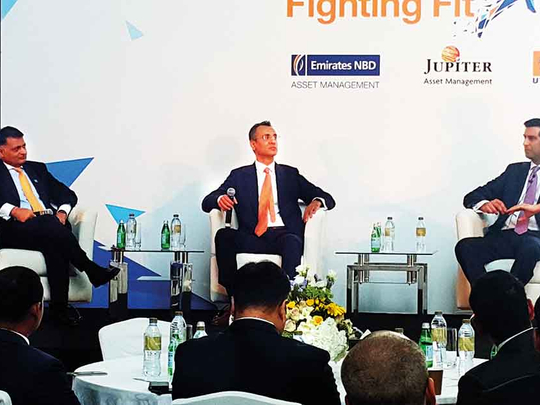
Dubai: Saudi Arabia is expected to see an inflow of a minimum of $45-46 billion (Dh165-Dh169 billion) of inflows post the potential FTSE Russell and MSCI emerging market index upgrade, which is about 10 per cent of the market capitalisation of the market, an Emirates NBD Asset Management executive said.
After underperformance last year compared to its regional peers, Saudi equities have gained 6.9 per cent so far in the year amid firm oil prices and on implementation of a slew of government reforms. This performance compares with more than 5.5 per cent loss on the Dubai Financial Market general index.
“There has been a fundamental re-rating of stocks in Saudi which has not necessarily been reflected in equity prices. What the market needs is a catalyst to unlock this pent up value and the upgrade to Emerging Market status should prove to be that trigger,” Usman Ahmad, Managing Director, Investments, Emirates NBD Asset Management told delegates at the Emerging Markets: Fighting Fit event.
Emirates NBD Asset Management expects about $5-6 billion of passive money will be allocated to Saudi markets as a result of an upgrade by FTSE Russell alone.
“We estimate a further $40 billion of capital inflows could result from a similar upgrade by MSCI in June. Given the current market capitalisation of Saudi at around $450 billion, flows of this magnitude should have a significant impact,” Ahmad said.
India outlook:
India was another markets on which fund managers were positive about.
On the back of strong fundamentals, overseas investors pumped in nearly 64 billion Indian rupees in equities in March so far followed by abn outflow last month on expectations of rebound in corporate earnings and easing of global oil prices.
“Since the taper tantrum India has made a remarkable resurgence of its macro economic fundamentals, economic stability, a government that committed on reforms, and that has underpinned the Moody’s upgrade that we got last year. In the past couple of years, interest rates have come down, lending costs have reduced. The country is serious about reforms, and this has underpinned the strength of Indian equity markets,” Praveen Jagwani, chief executive at UTI International said. India’s benchmark Sensex index has shed 3 per cent since January.












